Easter in Guatemala is a colorful and vibrant time. Guatemalans celebrate with parades, traditional foods and celebrations at home. Read on to experience it for yourself!
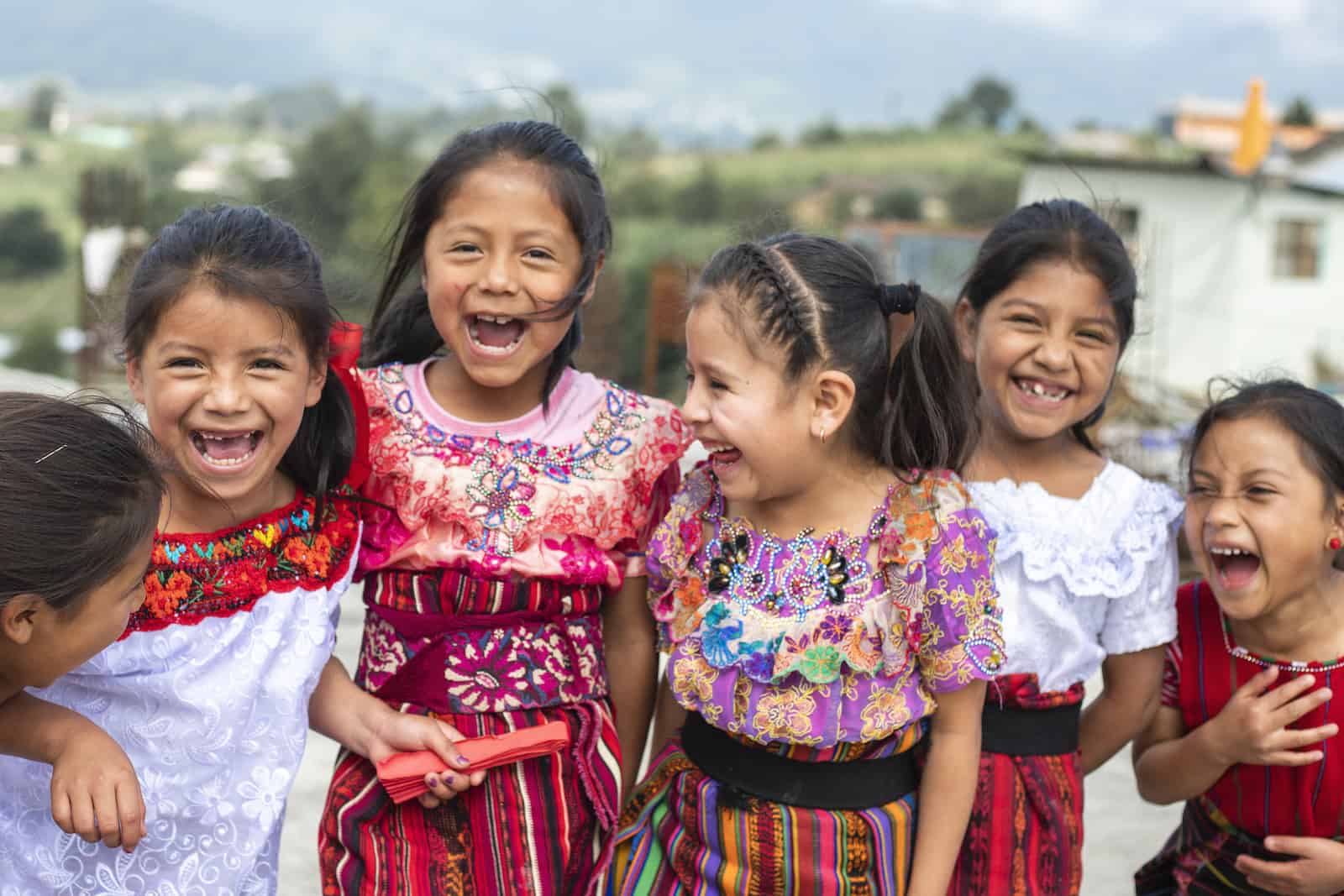
Guatemala, a country whose religion is chiefly Roman Catholic and Protestant, is deeply rooted in local traditions that make the celebration of Easter a colorful and massive one.
The festivities of Easter week, or Semana Santa, start on Palm Sunday and end the following Sunday, Resurrection Sunday. On Palm Sunday, the smell of palm leaves fills the streets as many pedestrians walk with small branches from the African palm.
The big event for Easter in Guatemala is a university parade in which participants wear long hoods to hide their identity. In its origins back in 1898, this parade would go down the streets of Guatemala City making fun of national and political matters (even international ones that may or may not affect Guatemala), as well as injustices the Guatemalan people were enduring at the time.
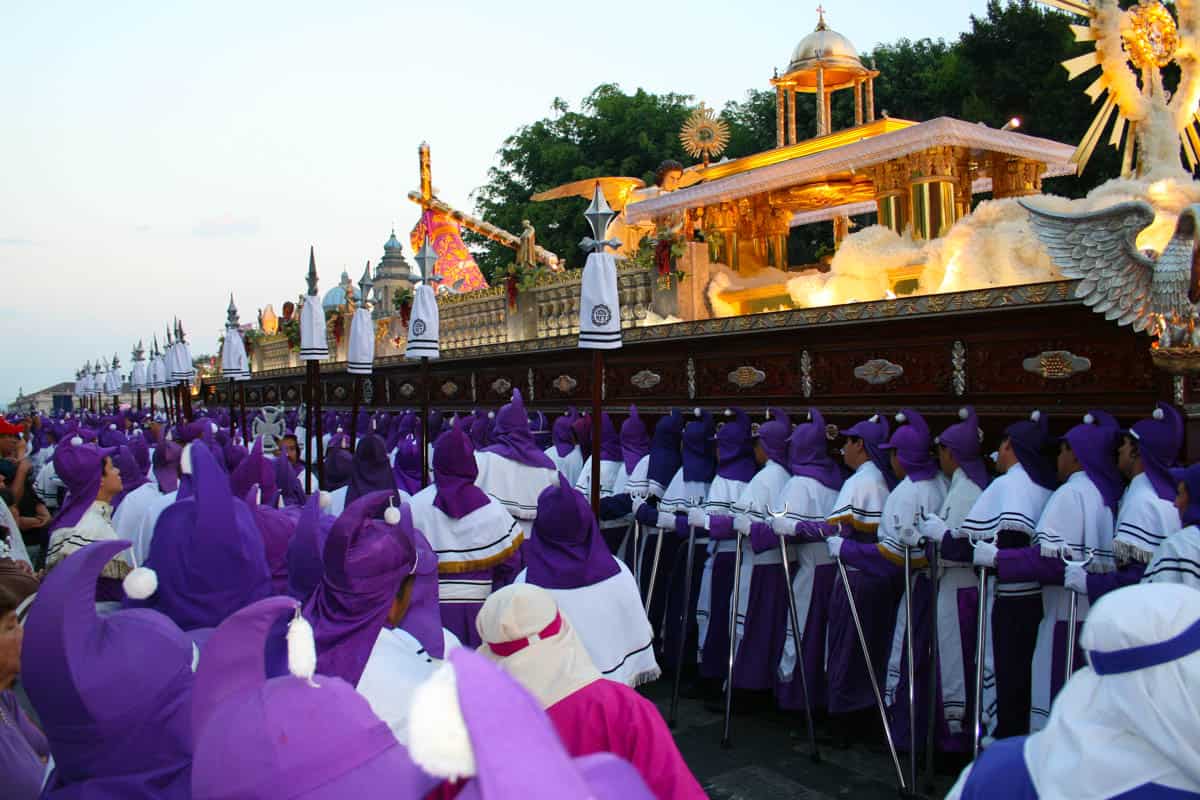
Countless processions take place across the country during the week before Easter. The largest and most famous takes place in Antigua, Guatemala. The main focus of these processions is a heavy and long dais made of fine wood with an statue of Jesus Christ on top.
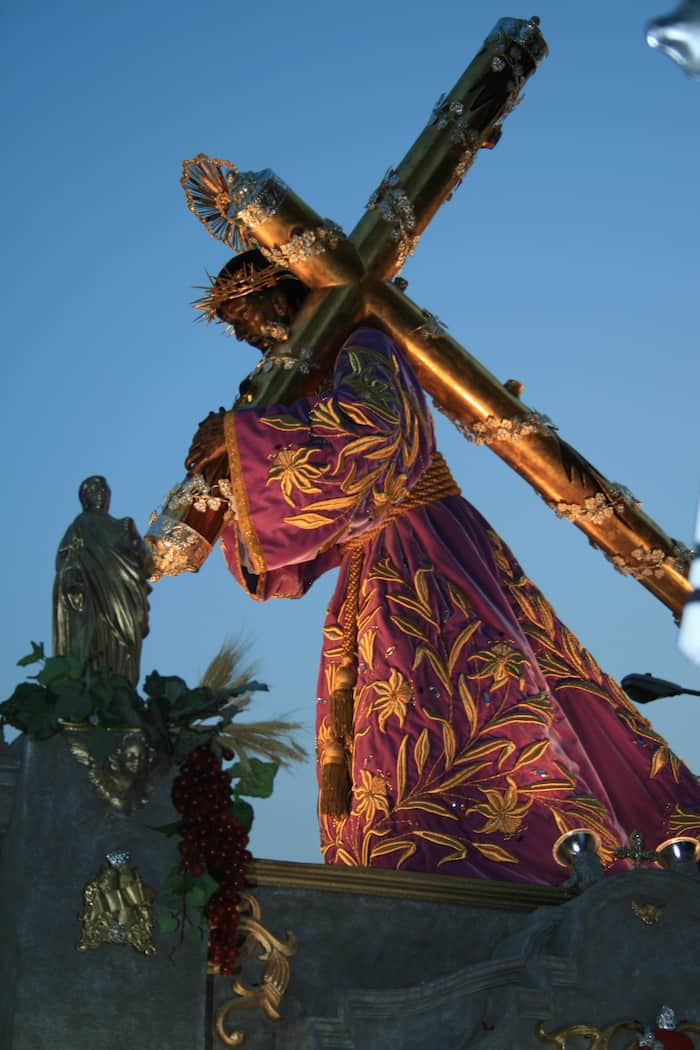
The dais is carried on the shoulders of dozens of men. Main streets are closed, causing enormous traffic jams for those who dare to drive. The sound of trumpets and bass drums fill the air. Dressed-up musicians play funeral marches to create a feeling of sorrow and sadness over the suffering of Christ before His death.
Large tapestries of sawdust called alfombras are dyed and formed into beautiful shapes on the ground for the procession to walk on. Often fruits and flowers are added to complete the alfombras. The scent of incense is spread by people walking at the head of the procession.
A young Guatemalan woman shared the background of Easter celebration in her country:
“I like the way Easter is celebrated. It can be perhaps an unusual way to proclaim the gospel but as a Christian I do not really mind about this kind of Easter celebration. I love a verse in the Bible that says, ‘But what does it matter? The important thing is that in every way, whether from false motives or true, Christ is preached. And because of this I rejoice.’ So I don’t mind about this whole thing. I want Christ to be preached!”
Easter Food in Guatemala
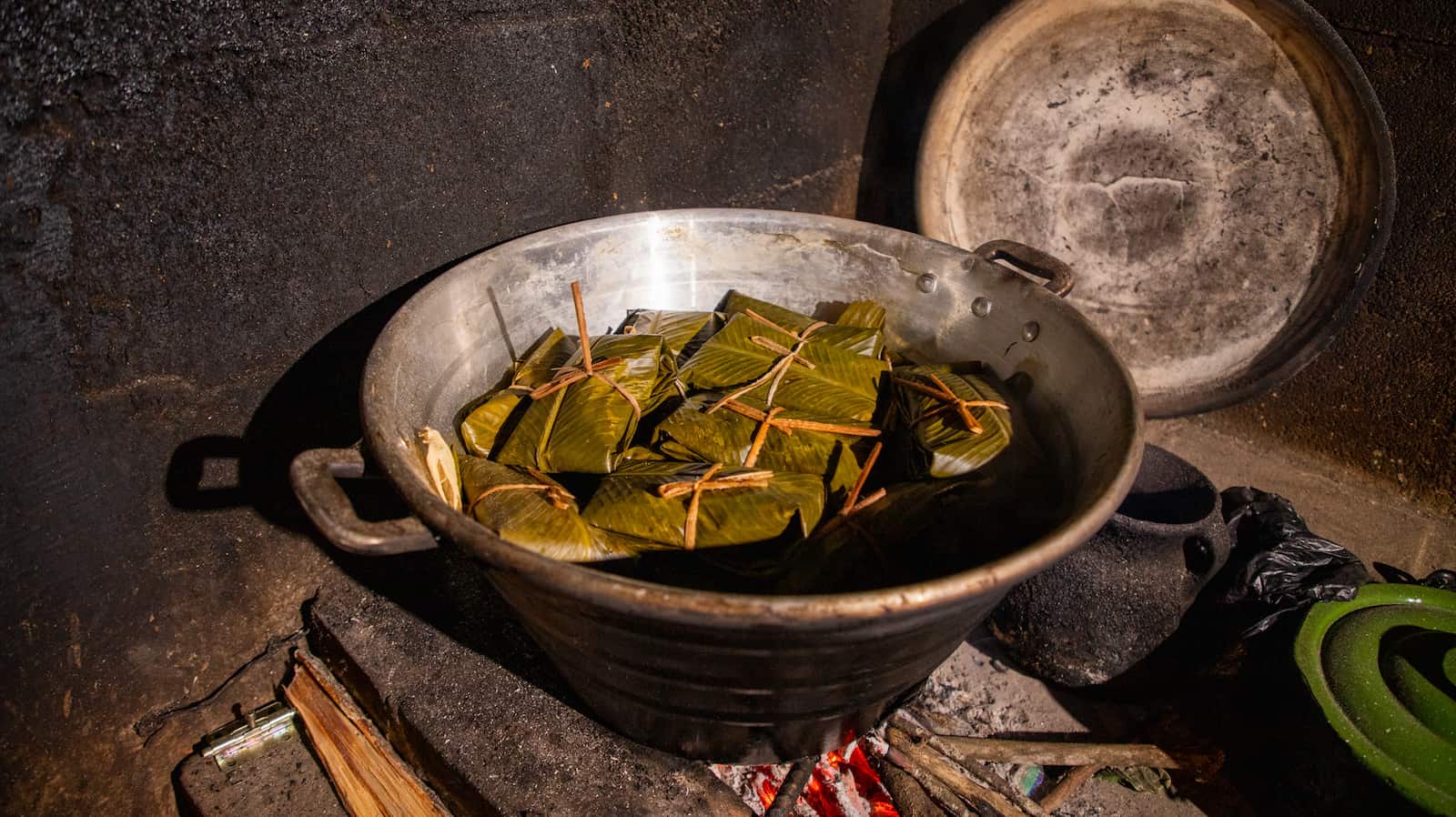
Tamales are a traditional dish in Guatemala often enjoyed at Easter, here cooked the traditional way, wrapped in leaves and cooked over the fire.

Children usually do not receive gifts at Easter as they do at Christmas. But special food is prepared this time of year such as curtido (a vegetable mix in which all vegetables are diced and cooked in vinegar to get a sour taste), fish wrapped in eggs, chickpea sweets, fruit mix, pumpkin sweets, pacaya palm wrapped in eggs, and spondias fruits.
How Protestants Celebrate Easter in Guatemala
Some protestant churches in Guatemala take a different approach to celebrating Easter. According to Manuel, a pastor of a Pentecostal church in Guatemala City, his church celebrates the Feast of the Passover during Easter week.
“We have celebrated here at church with a sort of special meal like the Jews used to celebrate. We roast ram’s meat and eat bitter herbs and hard-boiled eggs brought by small groups or families.”
Although many Guatemalans head to the beach or water parks during their time off for Easter week, Pastor Manuel says that his church stays in town to offer special opportunities to gather as a church to pray and remember.
The way Easter is celebrated in Guatemala by protestants varies from denomination to denomination. In a more conservative protestant church, Easter is observed with an early gathering at the temple for a special service celebrating Jesus’ resurrection, followed by a delicious breakfast.
How Children Celebrate Easter at Child Development Centers
Compassion International has been serving children living in poverty in Guatemala for 39 years. At the Tomás Cranmer Student Center, a Compassion-assisted center in Guatemala City, they try to instill in the Compassion-sponsored children a desire to celebrate this time of year as something very special:
“One week before, we start talking with the children about Easter,” says Rebeca, the center coordinator. “We share lessons with the students about when Christ was born and when He was risen so that they can really understand this time of the year. This week turns out to be more special because we remember what our Lord Jesus Christ went through.
The students also put on a play in which they recreate all Jesus went through.
Something else happens at the student center the week Easter is officially celebrated: a spiritual retreat.
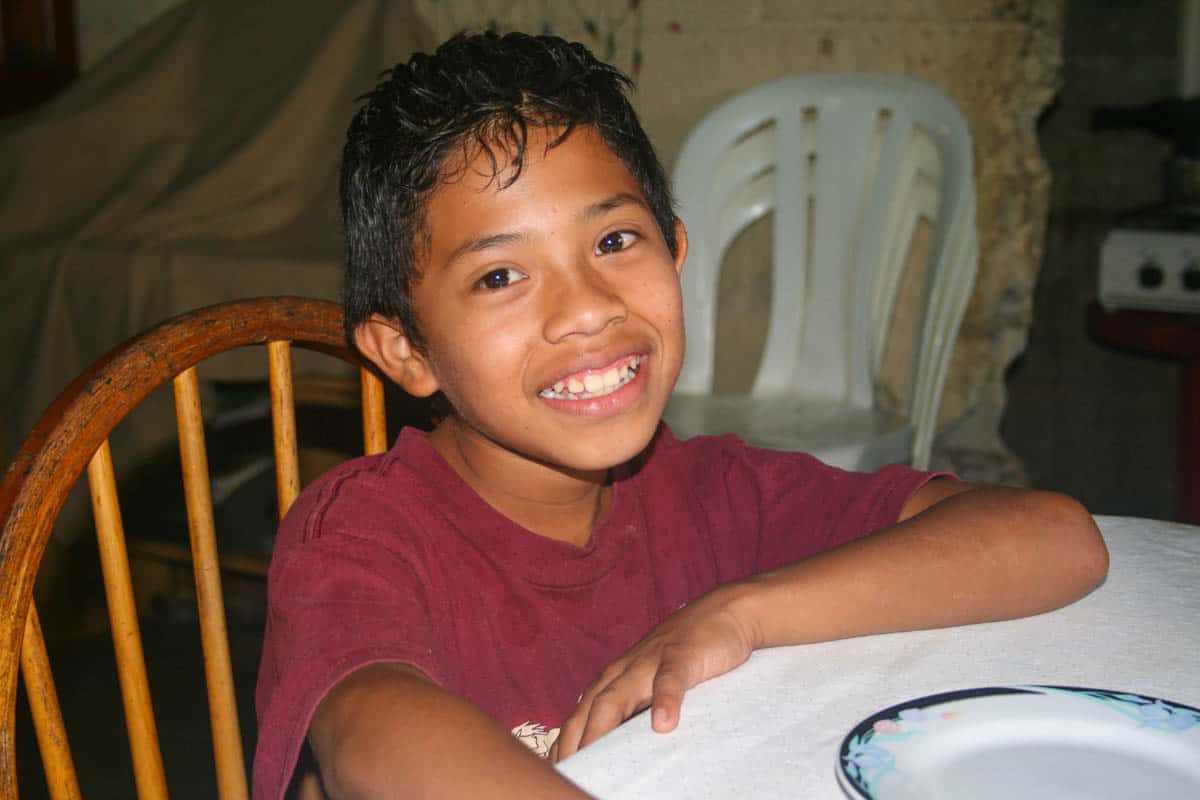
Wilmer, a 12-year-old boy who is shy with strangers but outgoing with his friends, is one of those who has benefitted from a spiritual retreat.
“I like the spiritual retreat for all the different fun activities we get to do there,” says Wilmer. “The activity I like the most is the bonfire because that is when we get to hear about God and we are ministered [to] by the message.
Wilmer was baptized last year at the Tomás Cranmer spiritual retreat. Wilmer’s grandfather has also been changed through learning about Christ’s resurrection.
Wilmer’s grandfather shares,
“The time I spent before accepting Christ as my Savior was something worthless and that completely changed once I became a Christian.
“Now, as my heart has changed from being a very cold one to a very warm one because of Christ, I am more than thankful to celebrate Christ’s resurrection! I love to go to church and take my family there. They love going there and we all are so thankful with our Lord Jesus for having changed all of us to believe in Him.”
Bonus: Find out what children learn about Easter at child development centers.
We hope you have enjoyed this peek into Easter in Guatemala. Now read about traditions in El Salvador!

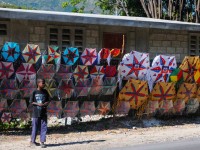
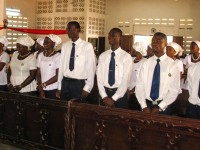
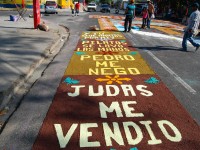
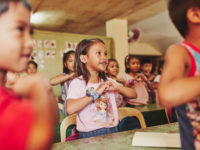


6 Comments |Add a comment
My husband who grew up in Guatemala did not understand what it meant to celebrate Easter. After some lessons on the Atonement and studying about the week leading up to Christ’s resurrection he exclaimed “Holy Week”. He then explained to me that in Guatemala they celebrate the whole week not just what we call Easter. Very educational for me.
My sponsored Guatemalan child had recently written that they don’t celebrate Easter where she lives. This article helped me understand why she made that statement. Thank you so much for this information.
Thank you so much for this insight into my sponsor child’s country! It’s great to see how much kids sponsored by Compassion appreciate the gift of Jesus, too. Keep up the excellent work you do!
Wow, I wish my neighborhood smelled of palm leaves rather than Easter eggs.
How awesome! This is the student center my sponsored girl, Alejandra, attends.
We have a discipleship ministry in Guatemala City to help those with their Christian walk have a blessed Easter.